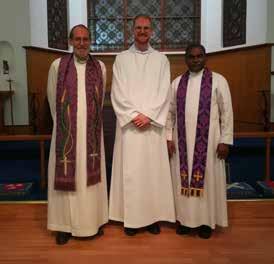
3 minute read
Expanding Horizons in Bahrain
from USPG Koinonia Issue 4 1/2021
by USPG
ISSUE 4 1/2021
By the Rev’d Thomas Pote
Rev'd Thomas Pote (centre)
To broaden my understanding of Christianity beyond the bounds of the Church of England, I went to Bahrain, in the diocese of Cyprus and the Gulf, to spend a month at St. Christopher’s Anglican Cathedral. I was part of an ecumenical congregation which welcomed Christians from many different countries and traditions, united by a desire to worship God while living in a foreign land. My time in Bahrain was not just to be spent in the cathedral community; I was there to learn about living as a Christian in a country where the Church is hosted, and to do this I needed to leave the cathedral compound. In Bahrain, there is great freedom afforded to Christians. This stems from the early days of the first American missionaries who arrived there to establish a hospital. These medics spent years faithfully serving the health needs of the Bahrainis and because of this, they were invited to build a church. These Christians placed human need before spiritual need, recognising that the language of sickness, hunger, thirst and grief is international, crossing class, race, religious and social boundaries. I was frequently struck by this model of Christian mission. Missionary work is boundup with proclaiming the Word of God, but that does not always happen with the name of Christ on our lips. Indeed, the model I experienced here was one of being Christ with people rather than telling them about Jesus. I think this is applicable in ministry in the UK too. In today’s culture, where fewer people identify as Christian, our actions speak louder than words as we preach the transforming love of Christ in the world. While visiting a labour camp, caught unawares, I was asked to preach in a makeshift chapel. Afterwards I apologised to my guide for not having a polished sermon. ‘Don’t worry’ was the reply, ‘your real sermon was you coming here to this God-forsaken place’. Actions not words. I witnessed this transforming love in two different charities I visited. The first was the port chaplaincy resourced by the Mission to Seafarers, a Christian mission society, and the Bahrain International Seafarers Association, run by Christians and Muslims. In addition to visiting seafarers onboard ship, the chaplaincy has often been involved in advocacy work on behalf of sailors stranded on vessels. This happens when companies go bankrupt or when ships are denied permission to dock. The chaplaincy provides material assistance to the seafarers while trying to negotiate with employers to get them ashore and back home. I saw another example of such inter-faith work at a shelter run by the Migrant Workers’ Protection Society. This charity provides food and shelter for predominantly female migrant workers, who are financially or physically abused by their employers. Once these workers leave the houses they work in, they are classed as ‘illegals’ and are unable to leave the country. The charity assists them by negotiating with their former employers and the judicial authorities for the return of their passports and a ticket out of the country. In both missions, the advocacy work is extremely delicate and requires a great deal of diplomacy. In both cases, there was a clear tension between speaking on behalf of the oppressed, and maintaining good relations with the government authorities. This essential relationship allows the charities to do their work and permits their voices to be heard on behalf of those they help. This placement helped me to reflect on how we as Christians preach the Good News in word, but more importantly in action as we seek to reveal Christ’s light in in our communities. I also saw the importance of seeking friendship with people of other faiths to do the common work that we are called to. Listening to people in Bahrain who actively pursue greater understanding and cooperation between different faith groups, I realised that looking beyond the limits of religious tolerance and building genuine friendship is vital as we build communities and strive for a more peaceful world. ■










